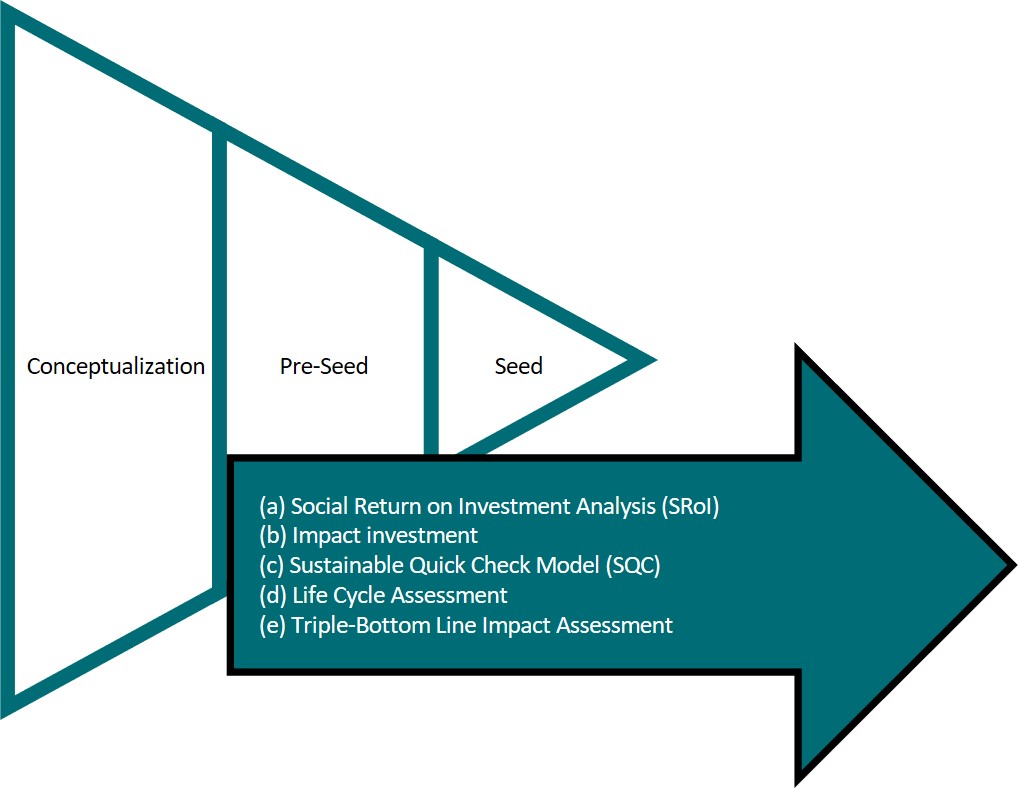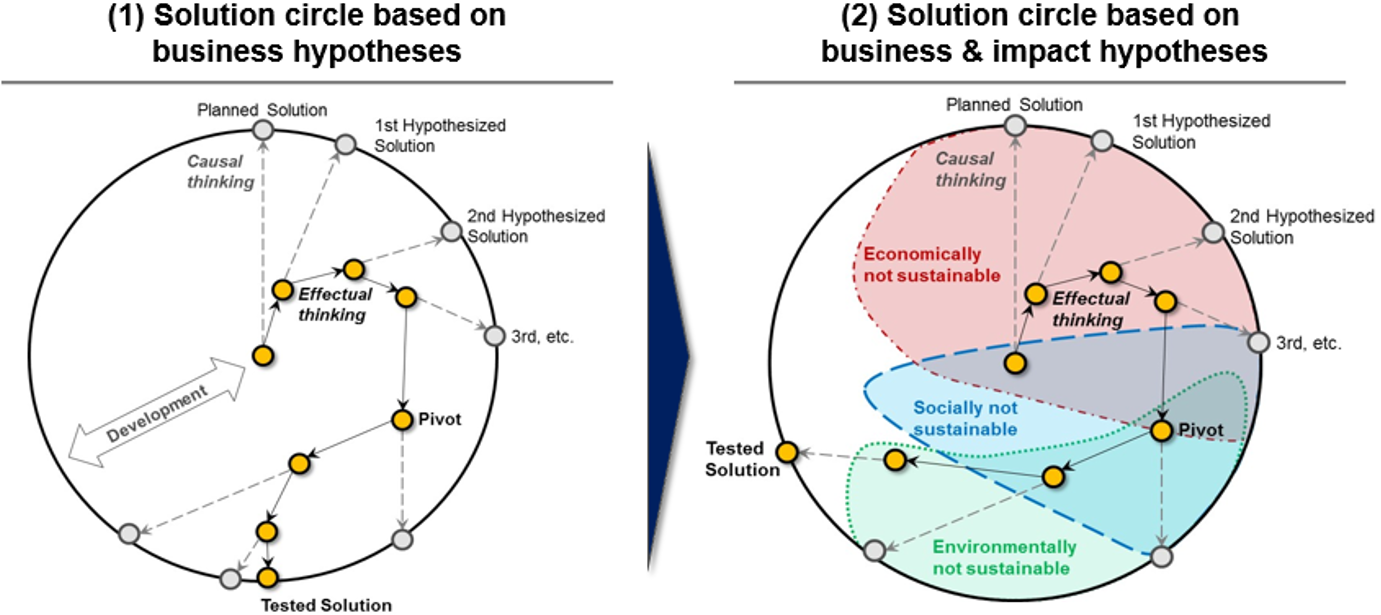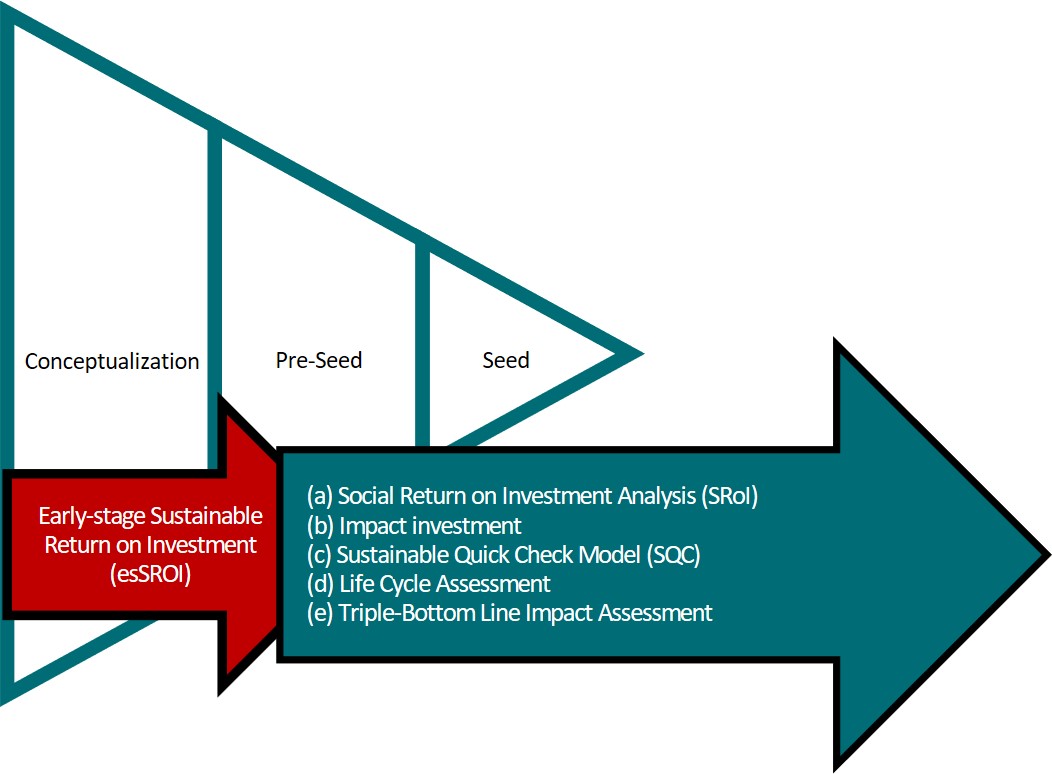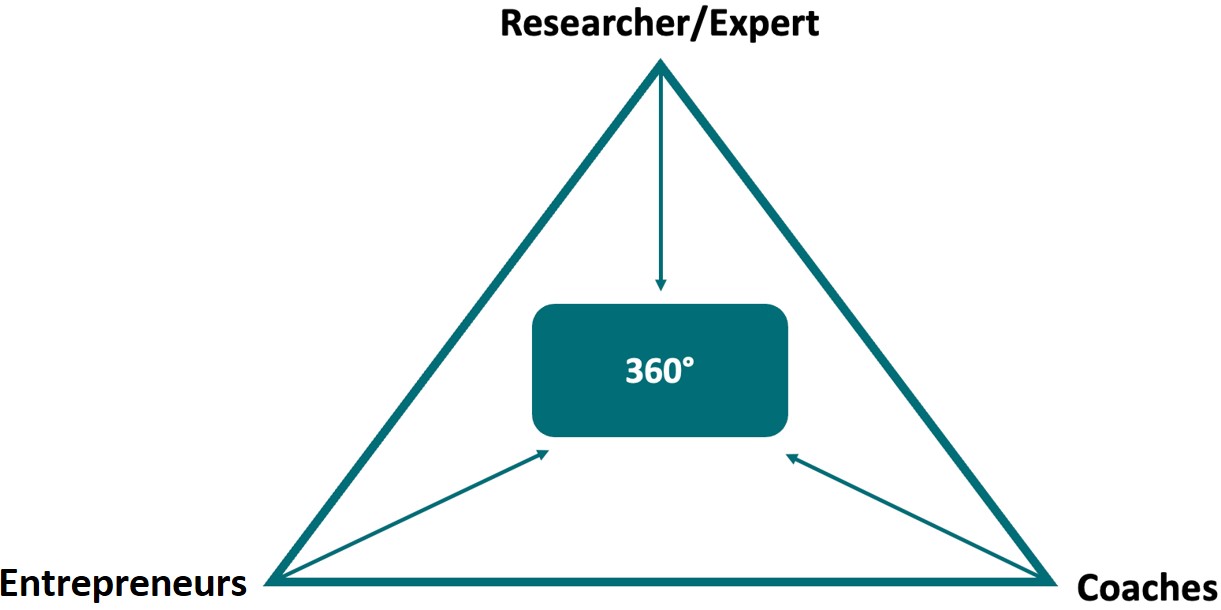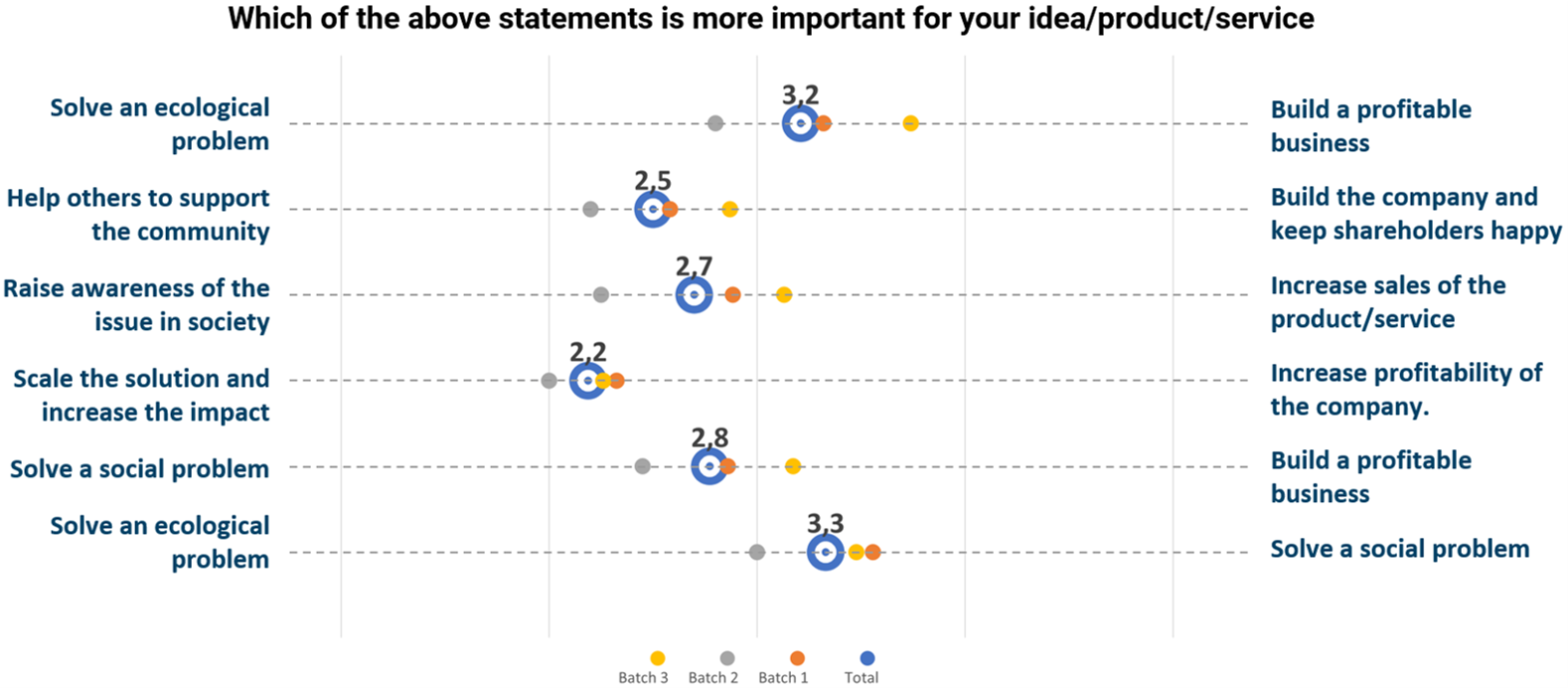Article Peer-Reviewed
Capturing the Sustainable Impact of Early-stage Business Models: Introducing esSROI
1
Department of Technology and Management, Technische Universität Berlin, Straße des 17. Juni 135, H76, 10623 Berlin, Germany
2
Centre for Entrepreneurship, Technische Universität Berlin, Hardenbergstraße 38, 10623 Berlin, Germany
†
These authors contributed equally to this work.
*
For correspondence.
Academic Editor:
Received: 13 May 2023 Accepted: 3 August 2023 Published: 7 August 2023
This article is part of the Special Issue Capturing the Sustainable Impact of Early-Stage Business Models.
Abstract
In this paper, we present an early-stage Sustainable Return on Investment (esSROI) measurement tool to evaluate the impact of early-stage business models. The main objective for developing the tool is to capture the holistic sustainability-related impacts of the incubation process from start-ups already during the conceptualization and pre-seed phases. An early, holistic impression of sustainable potential offers many opportunities to iteratively improve the degree of potential sustainable impact. The scope of designing and alternating business models is the widest early in the process before narrowing it down. This very early application differentiates esSROI from other tools that are used later in seed phases. Applying the tool in the conceptualization phase might make it even more usable already among (student) teams before incubation/acceleration. The quantitative measurement tool esSROI consists of a questionnaire design and follows a triangulation and long-term approach that includes three measurement points that capture the iterative progress. A preliminary study has been conducted in 2022 and shows that the tool is easy to use and accepted by founders.
Figures in this Article
Keywords
sustainability measurement; pre-seed, early-stage; sustainable return on investment; business model; pilot study
Copyright © 2023
Cagarman et al. This article is distributed under the terms of the Creative Commons Attribution License (CC BY 4.0), which permits unrestricted use and distribution provided that the original work is properly cited.
Funding
The Leapsome software is part of the “Science & Startups - Sustainable City” project funded by the European Union/European Social Funds and the State Berlin.
Cite this Article
Cagarman, K., Fajga, K., & Kratzer, J. (2023). Capturing the Sustainable Impact of Early-stage Business Models: Introducing esSROI. Highlights of Sustainability, 2(3), 171–184. https://doi.org/10.54175/hsustain2030013
References
1.
Lindsey, T. C. (2011). Sustainable principles: common values for achieving sustainability. Journal of Cleaner Production, 19(5), 561–565. https://doi.org/10.1016/j.jclepro.2010.10.014
2.
Muñoz-Torres, M. J., Fernández-Izquierdo, M. Á., Rivera-Lirio, J. M., Ferrero-Ferrero, I., Escrig-Olmedo, E., Gisbert-Navarro, J. V., et al. (2018). An assessment tool to integrate sustainability principles into the global supply chain. Sustainability, 10(2), 535. https://doi.org/10.3390/su10020535
3.
Bocken, N. M. P., Short, S. W., Rana, P., & Evans, S. (2014). A literature and practice review to develop sustainable business model archetypes. Journal of Cleaner Production, 65, 42–56. https://doi.org/10.1016/j.jclepro.2013.11.039
4.
Fichter, K., Lüdeke-Freund, F., Schaltegger, S., & Schillebeeck, S. J. D. (2022). Sustainability impact assessment of new ventures: An emerging field of research, Journal of Cleaner Production, 384, 135452. https://doi.org/10.1016/j.jclepro.2022.135452
5.
Castro, G. D. R., Fernandez, M. C. G., & Colsa, A. U. (2021). Unleashing the convergence amid digitalization and sustainability towards pursuing the Sustainable Development Goals (SDGs): A holistic review. Journal of Cleaner Production, 280, 122204. https://doi.org/10.1016/j.jclepro.2020.122204
6.
Schaltegger, S., Hansen, E. G., & Lüdeke-Freund, F. (2016). Business models for sustainability: Origins, present research, and future avenues. Organization & Environment, 29(1), 3–10. https://doi.org/10.1177/1086026615599806
7.
Lüdeke-Freud, F. (2020). Sustainable entrepreneurship, innovation, and business models: Integrative framework and propositions for future research. Business Strategy and the Environment, 29(2), 665–681. https://doi.org/10.1002/bse.2396
8.
Audretsch, D., Colombelli, A., Grilli, L., Minola, T., & Rasmussen, E. (2020). Innovative start-ups and policy initiatives. Research Policy, 49(10), 104027. https://doi.org/10.1016/j.respol.2020.104027
9.
Markman, G. D., Waldron, T. L., Gianiodis, P. T., & Espina, M. I. (2019). E pluribus unum: Impact entrepreneurship as a solution to grand challenges. Academy of Management Perspectives, 33(4), 371–382. https://doi.org/10.5465/amp.2019.0130
10.
Grafström, J., & Aasma, S. (2021). Breaking circular economy barriers. Journal of Cleaner Production, 292, 126002. https://doi.org/10.1016/j.jclepro.2021.126002
11.
Dijkstra, H., van Beukering, P., & Brouwer, R. (2020). Business models and sustainable plastic management: A systematic review of the literature. Journal of Cleaner Production, 258, 20967. https://doi.org/10.1016/j.jclepro.2020.120967
12.
Cagarman, K., Kratzer, J., von Arnim, L. H., Fajga, K., & Gieseke, M. J. (2020). Social entrepreneurship on its way to significance: The case of Germany. Sustainability, 12(21), 8954. https://doi.org/10.3390/su12218954
13.
Horne, J., Recker, M., Michelfelder, I., Jay, J., & Kratzer, J. (2020). Exploring entrepreneurship related to the sustainable development goals-mapping new venture activities with semi-automated content analysis. Journal of Cleaner Production, 242, 118052. https://doi.org/10.1016/j.jclepro.2019.118052
14.
Tiba, S., van Rijnsoever, F. J., & Hekkert, M. P. (2020). The lighthouse effect: How successful entrepreneurs influence the sustainability-orientation of entrepreneurial ecosystems. Journal of Cleaner Production, 264, 121616. https://doi.org/10.1016/j.jclepro.2020.121616
15.
Agrawal, A., & Hockerts, K. (2021). Impact investing: Review and research agenda. Journal of Small Business & Entrepreneurship, 33(2), 153–181. https://doi.org/10.1080/08276331.2018.1551457
16.
Blohm, I., Riedl, C., Füller, J., & Leimeister, J. M. (2016). Rate or trade? Identifying winning ideas in open idea sourcing. Information Systems Research, 27(1), 27–48. https://doi.org/10.1287/isre.2015.0605
17.
Achleitner, A. K., Lutz, E., Mayer, J., & Spiess-Knafl, W. (2011). Wolves in sheep’s clothing-assessing the integrity of social entrepreneurs (interactive paper). Frontiers of Entrepreneurship Research, 31(19), 12.
18.
Irene, B., Marika, A., Giovanni, A., & Mario, C. (2016). Indicators and metrics for social business: a review of current approaches. Journal of Social Entrepreneurship, 7(1), 1–24. https://doi.org/10.1080/19420676.2015.1049286
19.
McLoughlin, J., Kaminski, J., Sodagar, B., Khan, S., Harris, R., Arnaudo, G., et al. (2009). A strategic approach to social impact measurement of social enterprises: The SIMPLE methodology. Social Enterprise Journal, 5(2), 154–178. https://doi.org/10.1108/17508610910981734
20.
Hornsby, A. (2012). The Good Analyst. Impact Measurement and Analysis in the Social-Purpose Universe. Investing for Good CIC.
21.
Grabenwarter, U., & Liechtenstein, H. (2011). In search of gamma-an unconventional perspective on impact investing. IESE Business School Working Paper. https://doi.org/10.2139/ssrn.2120040
22.
Trautwein, C. (2021). Sustainability impact assessment of start-ups. Key insights on relevant assessment challenges and approaches based on an inclusive, systematic literature review. Journal of Cleaner Production, 281, 125330. https://doi.org/10.1016/j.jclepro.2020.125330
23.
Bond, A., Morrison-Saunders, A., & Pope, J. (2012). Sustainability assessment: the state of the art. Impact Assessment and Project Appraisal, 30(1), 53–62. https://doi.org/10.1080/14615517.2012.661974
24.
IAIA. (2020). International Association for Impact Assessment. https://www.iaia.org (accessed 23 June 2023).
25.
World Bank. (1991). Environmental Assessment Sourcebook. Vol. I. Policies, procedures, and cross-sectoral issues. United Nations Environment Programme (UNEP). https://doi.org/10.1596/0-8213-1843-8
26.
Elkington, J. (2018). 25 years ago I coined the phrase “triple bottom line.” Here’s why it’s time to rethink it. Harvard Business Review, 25, 2–5.
27.
Di Vaio, A., Hassan, R., Chhabra, M., Arrigo, E., & Palladino, R. (2022). Sustainable entrepreneurship impact and entrepreneurial venture life cycle: A systematic literature review. Journal of Cleaner Production, 378, 134469. https://doi.org/10.1016/j.jclepro.2022.134469
28.
Lingane, A., & Olsen, S. (2004). Guidelines for social Return on investment. California Management Review, 46(3), 116–135. https://doi.org/10.2307/41166224
29.
Puttick, R., & Ludlow, J. (2012). Standards of Evidence for Impact Investing. Nesta.
30.
Halberstadt, J., & Johnson, M. (10–12 September 2014). Sustainability management for start-ups and micro-enterprises: development of a sustainability-quick-check and reporting scheme. The 28th International Conference on Informatics for Environmental Protection, Oldenburg, Germany.
31.
Judl, J., Mattila, T., Manninen, K., & Antikainen, R. (2015). Life Cycle Assessment and Ecodesign in a Day-Lessons Learned from a Series of LCA Clinics for Start-Ups and Small and Medium Enterprises (SMEs). Finish Environment Institute.
32.
Varga, D. (2018). Triple-bottom-line impact analysis framework of fintech companies. Budapest Management Review, 49(11), 24–34. https://doi.org/10.14267/VEZTUD.2018.11.03
33.
Clarke-Sather, A., Miller, C. C., & Hickson, D. J. (2011). Can corporate social responsibility and environmental management initiatives enhance business performance? Business Strategy and the Environment, 20(6), 377–390.
34.
Hörisch, J., Freeman, R. E., & Schaltegger, S. (2014). Applying Stakeholder Theory in Sustainability Management: Links, Similarities, Dissimilarities, and a Conceptual Framework. Organization & Environment, 27(4), 328–346. https://doi.org/10.1177/1086026614535786
35.
Trautwein, F., Schmidt, S., & Whelan, G. (2018). Sustainable entrepreneurship in an evolutionary perspective: A co-evolutionary framework for research. Journal of Cleaner Production, 179, 277–289.
36.
Horne, J., Michelfelder, I., Recker, M., Jay, J., & Kratzer, J. (2019). Lean Impact Measurement – Predicting the sustainability impact of business model innovation in effectual ventures. In The sustainability impact of new ventures. Measuring and managing entrepreneurial contributions to sustainable development (pp. 19–50). Technische Universität Berlin. https://doi.org/10.14279/depositonce-8420
37.
Nicholls, J., & Cupitt, S. (2012). Great Britain, Office of the Third Sector. In A Guide to Social Return on Investment (2nd ed.). Society Media.
38.
Sarasvathy, S. D., & Dew, N. (2005). New market creation through transformation. Journal of Evolutionary Economics, 15, 533–565. https://doi.org/10.1007/s00191-005-0264-x
39.
Frederiksen D. L., & Brem, A. (2017). How do entrepreneurs think they create value? A scientific reflection of Eric Ries’ Lean Start-up approach. International Entrepreneurship and Management Journal, 13, 169–189. https://doi.org/10.1007/s11365-016-0411-x
40.
Leenders, R. Th. A. J., van Engelen, J. M. L., & Kratzer, J. (2007). Systematic design methods and the creative performance of new product teams: do they contradict or complement each other. Journal of Product Innovation Management, 24(2), 166–179. https://doi.org/10.1111/j.1540-5885.2007.00241.x
41.
Ries, E. (2011). The lean start-up. How today’s entrepreneurs use continuous innovation to create radically successful businesses (1st ed.). Crown Business.
42.
Blank, S. G. (2007). The four steps to the epiphany. Successful strategies for products that win (3rd ed.). S. G. Blank.
43.
Harms, R. (2015). Self-regulated learning, team learning and project performance in entrepreneurship education: Learning in a lean start-up environment. Technological Forecasting and Social Change, 100, 21–28. https://doi.org/10.1016/j.techfore.2015.02.007
44.
Weissbrod, I., & Bocken, N. M. P. (2017). Developing sustainable business experimentation capability – A case study, Journal of Cleaner Production, 142, 2663–2676. https://doi.org/10.1016/j.jclepro.2016.11.009
45.
Mueller, R., & Thoring, K. (2012). Design Thinking vs. Lean Start-up. A Comparison of Two User-Driven Innovation Strategies. In E. Bohemia, J. Liedtka, & A. Rieple (Eds.), Leading innovation through design. Proceedings of the DMI 2012 International Research Conference (pp. 151–161). Design Management Institute.
46.
DIN SPEC 90051-1 consortium. (2020). DIN SPEC 90051-1 - Specification for Sustainability Assessment of Start Ups — Part 1: Concept and Criteria for the Assessment of Potential and Actual Impacts of Venture Projects and Young Enterprises on the Environment, Society, and Economy. Beuth.
47.
Hall, M., Millo, Y., & Barman, E. (2015). Who and what really counts? Stakeholder prioritization and accounting for social value. Journal of Management Studies, 52(7), 907–934. https://doi.org/10.1111/joms.12146
48.
Moody, M., Littlepage, L., & Paydar, N. (2015). Measuring social return on investment: Lessons from organizational implementation of SROI in the Netherlands and the United States. Nonprofit Management and Leadership, 26(1), 19–37. https://doi.org/10.1002/nml.21145
49.
Yates, B. T., & Marra, M. (2017). Social Return on Investment (SROI): Problems, solutions… and is SROI a good investment? Evaluation and Program Planning, 64, 136–144. https://doi.org/10.1016/j.evalprogplan.2016.11.009
50.
Carroll, G. R. (2015). Authenticity: Attribution, value, and meaning. In R. A. Scott & M. C. Buchmann (Eds.), Emerging trends in the social and behavioral sciences: An interdisciplinary, searchable, and linkable resource. Wiley. https://doi.org/0.13140/2.1.4697.6807
51.
Mahsud, R., Imanaka, J. L., & Prussia, G. E. (2018). Authenticity in business sustainability: overcoming limitations in strategic management constructs. Sustainability Accounting, Management and Policy Journal, 9(5), 666–684. https://doi.org/10.1108/SAMPJ-02-2018-0036
Metrics
Loading...
Journal Menu
Journal Contact
Highlights of Sustainability
Editorial Office
Highlights of Science
Avenida Madrid, 189-195, 3-3
08014 Barcelona, Spain
08014 Barcelona, Spain
Ms.
Cathy Wang
Managing Editor
